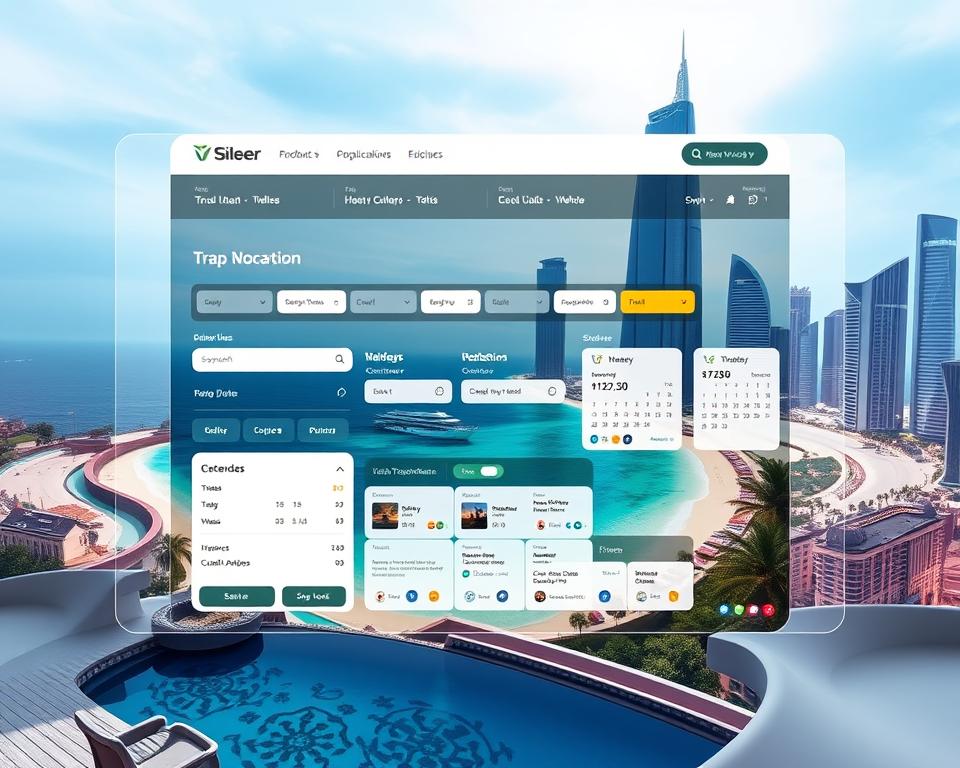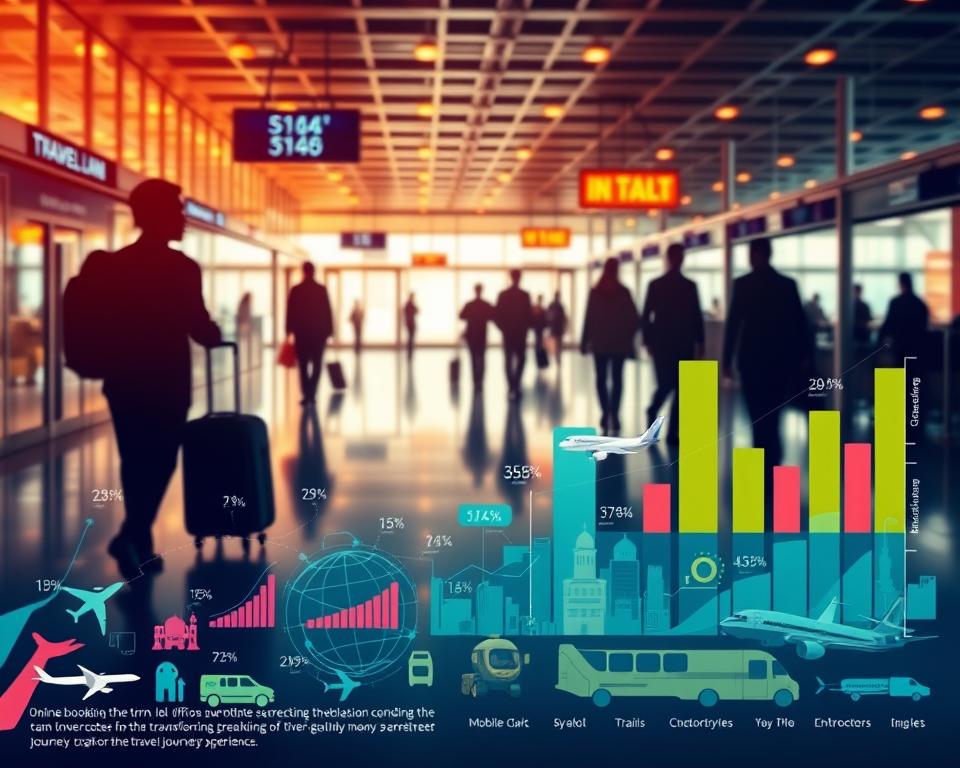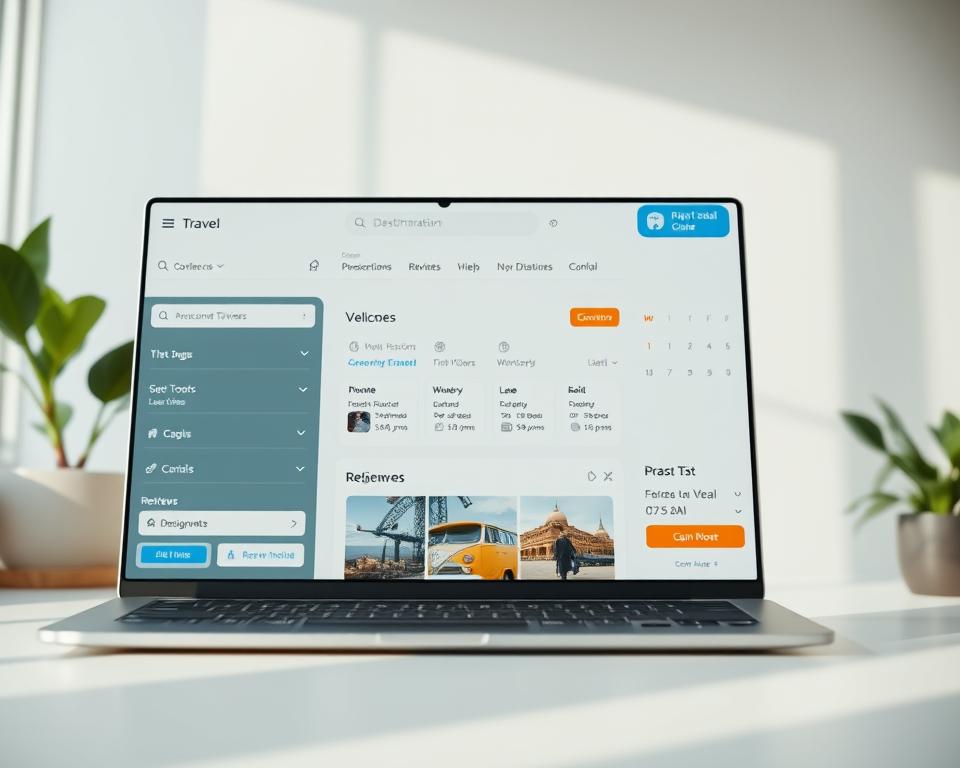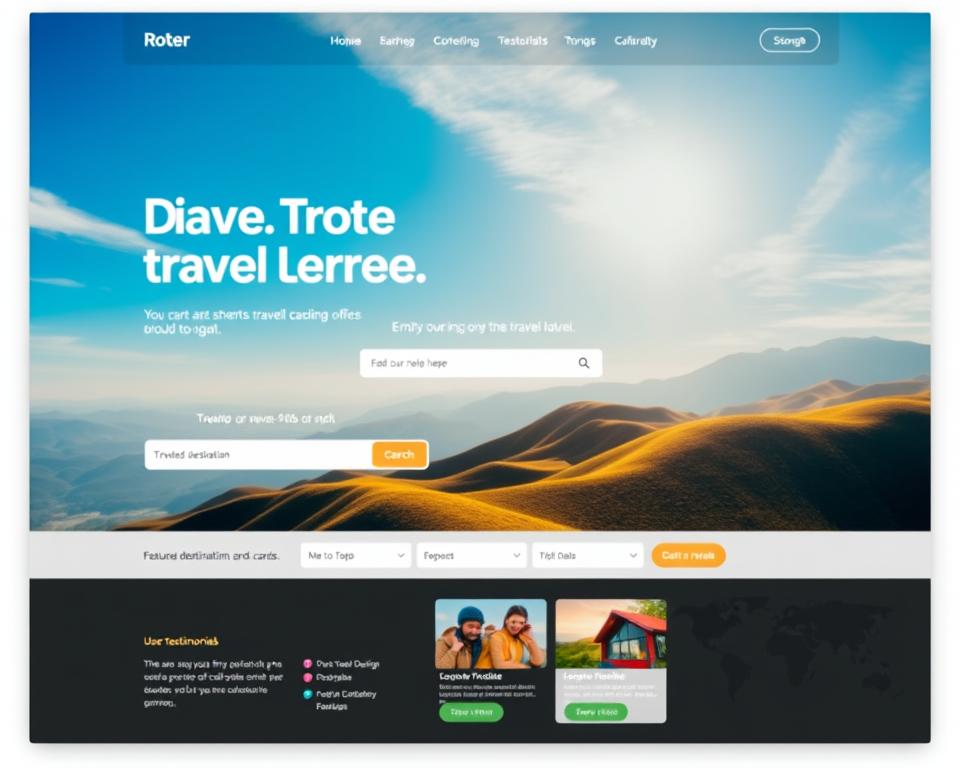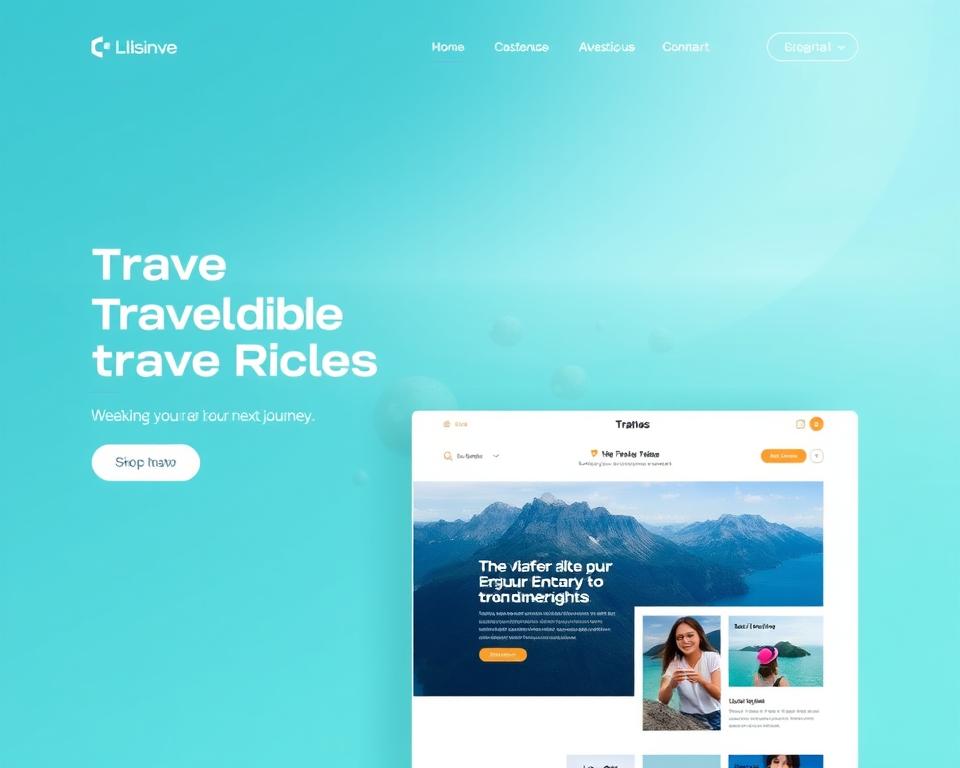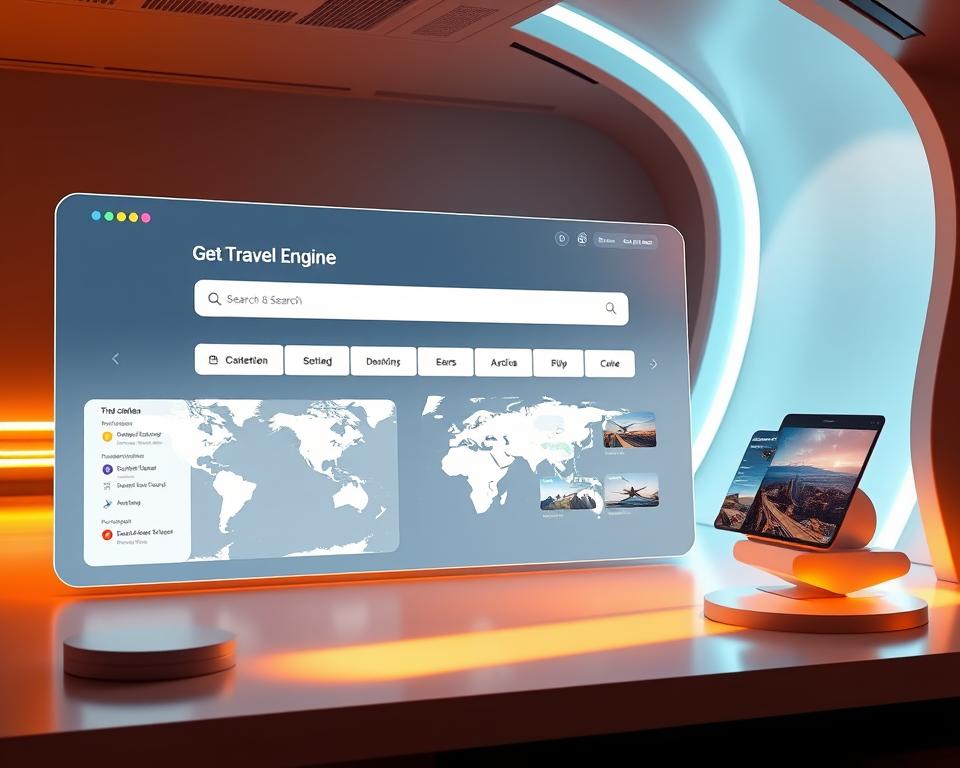A travel booking platform is complex, needing deep knowledge of travel, tech, and what people want. To make a top online travel agency, you must know the market and keep up with new tech. Building a portal like Expedia or Booking.com takes many steps, from planning to launch and upkeep.
To make a successful online travel agency, you need to really get the travel industry and the latest tech. Using the right tech and knowing what customers want can make your platform stand out. A well-made online travel agency can help you stay ahead and boost your earnings.
Table of Contents
Introduction to Building a Travel Booking Portal
In this article, we’ll show you how to build a travel booking portal like Expedia or Booking.com. We’ll talk about what makes a modern travel booking platform great, the tech you need, and how to set up your infrastructure. We’ll also cover why user experience and design are key, as well as security and following rules.
Key Takeaways
- Understand the online travel booking market and the latest travel technology
- Create a competitive online travel agency with a user-friendly interface
- Stay up-to-date with the latest travel technology and consumer behavior
- Develop a travel booking platform with essential features and technical requirements
- Ensure security measures and compliance requirements are in place
- Focus on user experience and interface design to attract and retain customers
Understanding the Online Travel Booking Market
The online travel booking market is booming, with millions booking trips online each year. To make a successful travel booking portal, knowing the market size, projections, and key players is key. The travel industry trends show a big move to online booking, with more people using the internet to plan and book their trips.
Big names like Expedia and Booking.com have raised the bar for user experience and functionality. New players need to be creative and competitive to get a piece of the market. A good hotel booking system and flight booking engine are vital for a successful portal. They help travelers find and book their stays and flights easily, making the process smoother and more convenient.
Some important features of a top travel booking portal include:
- User-friendly interface
- Real-time booking and availability
- Secure payment processing
- Competitive pricing and discounts
By grasping the online travel booking market and using the latest travel industry trends and tech, developers can build a winning travel booking portal. A well-made portal with a strong hotel booking system and flight booking engine helps travelers plan and book their trips better. It becomes a valuable tool in the competitive online travel market.
Essential Features of a Modern Travel Booking Platform
A modern travel booking platform needs key features to keep customers coming back. It should be easy to use, have a good search function, and keep payments safe. The travel booking software must offer many travel choices, like flights, hotels, and car rentals.
Features like price comparisons, customer reviews, and personalized tips can make a big difference. The online travel agency software should also send real-time updates and alerts. This keeps customers in the loop about any travel plan changes.
For travel technology solutions, the platform should work well with airlines, hotels, and car rental companies. This is done through APIs and other tools, making booking smooth and quick.
- Increased customer satisfaction and loyalty
- Improved booking efficiency and reduced errors
- Enhanced revenue and profitability for travel agencies and tour operators
By adding these key features and using the latest travel technology solutions, a modern platform offers a great experience. It also helps travel agencies and tour operators grow and succeed.
Technical Requirements and Infrastructure Setup
Building a travel booking portal needs a solid technical setup. This includes picking the right servers, designing a strong database, choosing the best technology, and planning for cloud hosting. A good infrastructure ensures the site can handle lots of users and works smoothly. This is key for travel website development and travel software development.
Choosing the right cloud hosting for travel websites is also vital. It affects how well the site scales, stays reliable, and performs. With cloud hosting, travel sites can grow or shrink as needed. This means users can always find the site and make bookings without trouble.
- Server capacity and performance to handle high traffic
- Database architecture to store and manage large amounts of travel-related data
- Technology stack selection to ensure compatibility and efficiency
- Cloud infrastructure planning to ensure scalability and reliability
With careful planning, travel booking portals can offer a smooth and efficient user experience. This is crucial for success in the competitive online travel market.
Developing Your Business Model and Revenue Streams
Creating a travel booking portal needs a solid business model and clear revenue streams. The travel industry uses different models. For example, some earn a commission on each booking. Others charge a subscription fee for premium services.
Online travel agencies can also make money through ads. Travel companies pay to advertise on these platforms. Knowing how to use these models is key to making money and keeping up with big players.
To do well, you must study the market. Look at its size, growth, and major players. Understanding the travel industry and its revenue streams helps build a lasting travel booking portal.
When planning your business model and revenue streams, consider these options:
- Commission-based models: earning a travel booking commission on each booking
- Subscription models: offering access to premium services for a fee
- Advertising models: generating revenue through advertising from travel-related businesses
Building a Travel Booking Portal Like Expedia or Booking.com: Core Development Phases
Creating a travel booking portal is a complex task with several key phases. A good travel website design is vital for a smooth user experience. The journey starts with setting the project’s scope, timelines, and technical needs. This is a critical step in the travel software development lifecycle.
The next step is designing a beautiful and easy-to-use interface. This involves creating a design and wireframe. Then, agile development for travel projects kicks in. This method allows for quick changes and keeps the development process flexible. It helps developers meet the changing needs and deliver a top-notch platform.
Some important parts of the development process include:
- Planning and documentation to define the project’s scope and timelines
- Design and wireframing to craft the user interface and experience
- Development sprints to build the platform using agile methodologies
- Testing and quality assurance to ensure the platform meets the required standards
By sticking to these core development phases and using agile development for travel projects and travel software development lifecycle best practices, you can make a successful travel booking portal. It will meet your users’ needs and stay competitive in the market.
Integration with Travel Service Providers
When building a travel booking portal, linking with travel service providers is key. This means connecting with many travel suppliers to give customers lots of choices. Travel API integration is crucial for getting real-time inventory and prices.
Using GDS systems for travel lets portals offer a wide range of travel options. This includes flights, hotels, and car rentals. By teaming up with airlines, hotels, and other suppliers, portals can show real-time prices and availability. Also, setting up secure payment gateways for travel booking is vital for smooth transactions.
Important things to think about when integrating with travel providers include:
- Ensuring secure and reliable connections with travel suppliers
- Implementing efficient payment processing systems
- Providing real-time inventory and pricing updates
By focusing on these points, travel booking portals can offer a great experience for customers. This can help grow the business and lead to success.
User Experience and Interface Design Best Practices
A well-designed interface can greatly improve user engagement and conversion rates on travel websites. The user experience in travel booking is key to a website’s success. With more people using mobile devices, it’s vital to adopt a mobile-first design for travel sites.
Best practices for travel website design include making the site easy to use and navigate. Features like one-click booking and personalized travel recommendations can also help. By following these trends, travel booking portals can offer a smooth user experience, boosting customer satisfaction and loyalty.
A mobile-first design for travel websites makes the user experience more streamlined and efficient. It focuses on the most important features and functions. By prioritizing the user experience in travel booking, travel sites can stay competitive and provide a unique, personalized experience for their customers.
Some key considerations for travel website design trends include:
- Simple and intuitive navigation
- Personalized travel recommendations
- One-click booking and payment options
- Mobile-first design for travel websites
Security Measures and Compliance Requirements
Keeping a travel booking portal safe and following rules is key. It protects user info and builds trust. A secure site must have strong travel website security to keep data safe.
Travel sites must follow payment security for travel booking rules, like PCI-DSS. This keeps transactions safe and stops data leaks. Also, they must meet GDPR compliance for travel to protect user data privacy and security.
- Implementing robust data protection standards
- Using secure payment gateways
- Complying with regulatory requirements, such as GDPR
By focusing on security and following rules, travel sites can keep user info safe. This builds trust and makes the site a reliable place for booking travel online.
Implementing Search and Booking Functionality
Having good search and booking features is key for a travel booking site. A top-notch travel search engine development system finds the right travel options fast. This makes it easier for users to find what they’re looking for.
A strong booking engine for travel handles lots of bookings smoothly. It also gives users a great experience. Plus, a good reservation management software keeps track of bookings and inventory.
- Real-time inventory management
- Automated booking confirmations
- Secure payment processing
With these parts working together, a travel booking site offers a smooth experience. This makes users more likely to come back and book again.
Mobile App Development Strategy
Creating a mobile app for travel booking is key to better user engagement and higher conversion rates. A good travel mobile app development plan should aim for a native app. It should offer a smooth and personalized booking experience. This can be done by adding features like push notifications for updates and special deals.
The app must be designed with the user in mind. It should be easy to use, fast, and safe. Travel app design is crucial for a good user experience. Important aspects of travel app design include:
- Simple and intuitive navigation
- High-quality images and videos
- Personalized recommendations
- Secure payment processing
Investing in mobile apps for travel booking can expand a business’s reach. It gives customers a handy way to book travel anytime. A well-designed app can also boost customer loyalty and increase revenue.
When making a travel booking app, keep up with the latest trends and tech in travel mobile app development. This means adding features like augmented reality, artificial intelligence, and machine learning to improve the user experience.
By having a solid mobile app development strategy, businesses can make a successful travel booking app. This app will meet customer needs and stay competitive.
Marketing and Customer Acquisition Techniques
Getting and keeping customers is key for a travel booking portal’s success. Good travel marketing can boost visibility and attract potential customers. Using digital marketing, like social media and email, helps engage and promote services to customers.
Important techniques for getting and keeping customers include search engine optimization to show up in search results. Also, loyalty programs and personalized offers keep current customers coming back. These strategies help travel booking portals grow by building loyalty.
Key customer retention strategies in travel include:
- Implementing loyalty programs to reward repeat customers
- Offering personalized offers and recommendations based on customer preferences
- Providing excellent customer service to build trust and loyalty
By focusing on keeping customers and using smart marketing, travel booking portals can build a loyal base. This success comes from a mix of digital and traditional marketing. It also depends on understanding what customers want and need.
Performance Monitoring and Analytics
Effective travel website analytics is key to spotting areas for improvement. It helps make the platform better for everyone. By tracking important metrics like conversion rates and user engagement, the site can make smart choices. This leads to a better user experience, better marketing, and more money.
For example, tracking travel website performance means looking at how users act. This helps make the site more user-friendly and boosts bookings.
Also, data analytics for travel booking uncovers trends in user behavior. This knowledge helps the portal make smart choices about marketing and money. It keeps the site ahead of the competition and offers a top-notch experience.
Some big pluses of using travel website analytics are:
- Improved user experience
- Increased revenue
- Enhanced marketing strategies
- Competitive advantage
Maintenance and Scaling Considerations
After launching a travel booking portal, it’s key to focus on travel website maintenance. This keeps the platform competitive and growing. It involves regular updates and security patches to protect against threats. Also, optimizing performance for more traffic and bookings is crucial.
For scaling for travel booking, the platform’s architecture and infrastructure are vital. You need to plan for more server capacity and database optimization. This ensures the platform can handle more traffic and bookings smoothly.
To keep performance confidential for travel top-notch, monitoring the platform’s performance is essential. Track page load times, error rates, and user engagement. This way, any issues can be fixed quickly, keeping the platform competitive and growing.
- Regular software updates and security patches
- Performance optimization and monitoring
- Scaling infrastructure to accommodate growth
- Database optimization and management
By focusing on these areas, a travel booking portal can stay competitive, grow, and offer a great user experience.
Future-Proofing Your Travel Portal
To stay ahead in the travel industry, it’s key to focus on the future of travel booking. This means embracing travel technology trends and investing in innovation in travel industry solutions. By doing this, travel booking portals can offer a top-notch experience, making them stand out.
Integrating new tech like AI and blockchain into your portal is a smart move. AI can give personalized travel tips, while blockchain boosts security and transparency. For more on making a travel booking portal, check out this resource.
Important steps for future-proofing your portal include:
- Keeping up with the latest travel technology trends
- Investing in innovation in travel industry solutions
- Offering a smooth and personalized user experience
By focusing on these areas, travel booking portals can keep their edge and succeed in the changing travel world. This success comes from innovation in travel industry and the newest travel technology trends.
Conclusion
Creating a travel booking portal like Expedia or Booking.com needs careful planning. It involves market research, feature development, technical setup, and marketing. The travel booking market is growing, offering a chance for entrepreneurs and travel businesses to make money.
This guide helps you build a successful online travel agency. It covers everything from knowing your audience and adding key features to keeping your platform safe and growing. Each step is important to make your portal stand out online.
Success comes from always improving, focusing on customers, and knowing the travel industry well. With the right team, resources, and strategy, your portal can be the top choice for travelers. It will offer easy booking and great service.







